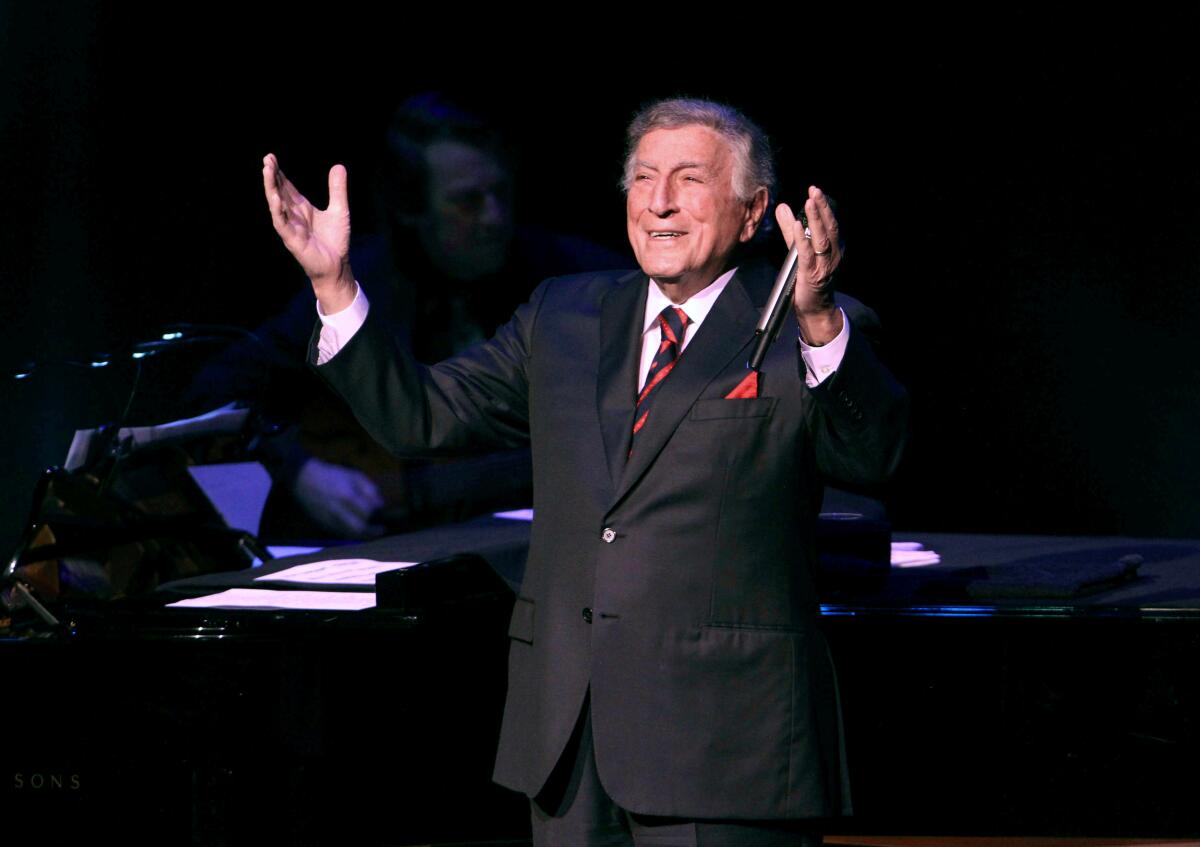Review: Ageless at 90, Tony Bennett brings his eternal spring to Dudamel and the L.A. Phil

- Share via
Ten summers after Tony Bennett made his Hollywood Bowl debut in 1962, the Los Angeles Philharmonic advertised an evening featuring him at the Bowl with the orchestra and its music director, Zubin Mehta. But as jazz critic Leonard Feather wrote in his Times review about the meeting of Bennett and Mehta: “If that summit ever took place, it was backstage over coffee.” Mehta opened the concert with Beethoven’s Fifth Symphony and then dashed to LAX for a flight to Israel, where he had another concert waiting. The pianist in Bennett’s combo cued the orchestra.
It wasn’t, in fact, until last Friday night, 55 years and a day to the date of the singer’s Bowl debut and not quite three weeks before his 91st birthday, that an actual summit between Bennett and an L.A. Phil music director finally took place.
Truth be told, this didn’t turn out to be much of a meeting. For his long set in the second half of the program, Bennett again had a jazz combo with which he closely collaborated. Gustavo Dudamel mostly looked on, the orchestra used in but a handful of barely noticeable backups, more there for optics than acoustics. Bennett never even bothered to acknowledge Dudamel’s presence until the last of his curtain calls; as people were heading for the exits, the two walked out on stage together.
Still, this was not a total bust for the conductor and orchestra. In an engaging, crowd-warming first half they played a pair of Verdi overtures (“La Forza del Destino” and “Nabucco”) with demonstrative verve, Henry Mancini movie tunes (“Charade” and “Moon River”) with graciousness and Mancini’s showy concert piece, “Strings on Fire!” with flair. After intermission, Dudamel did have an opportunity, however diminished, to further display his versatility, following the orchestra’s first week of the Bowl season with American ballet star Misty Copeland and legendary Dodgers broadcaster Vin Scully.
This night, nevertheless, was all about Bennett. His longevity is a story in itself. Back at the Bowl in 1982, when at 56 there was already talk about how well his voice was holding up, he told The Times, “I don’t think I’ll ever get disinterested in or blasé about popular song.” He hasn’t, as year after year after year he triumphs over time.
Clearly, Bennett doesn’t know when to stop. He sang some two-dozen songs in his long set. More than once the evening seemed to come to an end. He belted an arresting high-note finish, the stage lights came up, and then he said he wanted to go on. The crowd wanted him to go on too. He did.
He, of course, clung to the standards, many songs that he had popularized. Numbers, though, took on new meaning sung by so spry a nonagenarian star, who held the stage for well over an hour, never faltered on a lyric, hit a lot of pitches on the nail, retained high notes and showed himself to remain as agile a dancer as singer.
Having practically run onto the stage, Bennett made “Stepping Out With My Baby” easily believable. He’s always had rhythm, which a jazz-inflected “I Got Rhythm” readily proved. He ended “How Do You Keep the Music Playing” with the line, “The music never ends,” but for him it never does. “The Good Life”? Bennett has it, and here he managed to throw in a line about Lady Gaga, his erstwhile partner, just to prove that. “It Amazes Me”? And everyone else.
“I’m Old Fashioned,” though, is what Bennett’s singing is really about. That his voice remains recognizable only has a little bit to do with timbre. He has the timing, the articulation, the attention to word, the unfussiness that the Great American Songbook requires. If he can’t be expected to retain a young vocalist’s tone, he has always known how to employ raspiness for jazz edge.
A jazz singer, he still is. His fine quartet — Billy Stritch, piano; Gray Sargent, guitar; Harold Jones, drums; Marshall Wood, bass — added individuality, and Bennett liked nothing more than putting his microphone up to the players when they took welcome solos. He also had the habit of holding the mike close to his own mouth. He might think of doing that somewhat less.
Song after song, abbreviated though many were, was maybe a bit too much of a good thing, just as the L.A. Phil now and then supplying syrupy string arrangements was too wasteful of a good thing.
But when Bennett said it all and sang it all as he reached the climax “This Is All I Ask,” the orchestra here at least semi-effective, with the lines: “And let the music play as long as there’s a song to sing / And I will stay younger than spring.” This was no longer just a lyric or just a spring. It was the sound of a man prevailing though 90 summers, and of the sun still brightly shining.
MORE NEWS AND REVIEWS
Dudamel and Beethoven — and Vin Scully — for the common man
Vin Scully at the Bowl: ‘One of the most thrilling moments of my life’
Dudamel gives Misty Copeland the royal treatment
More to Read
The biggest entertainment stories
Get our big stories about Hollywood, film, television, music, arts, culture and more right in your inbox as soon as they publish.
You may occasionally receive promotional content from the Los Angeles Times.











